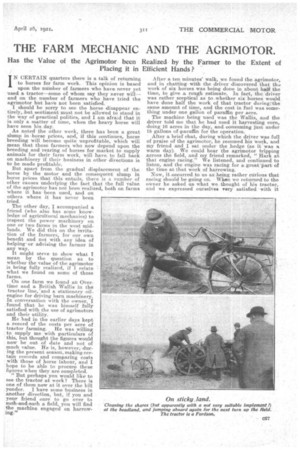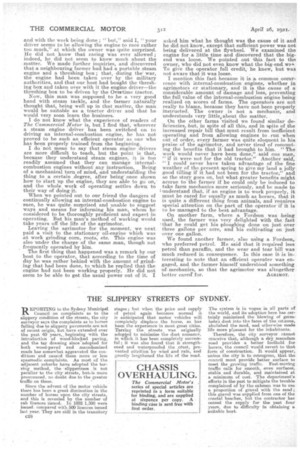THE FARM MECHANIC AND THE AGRIMOTOR,
Page 23

Page 24

If you've noticed an error in this article please click here to report it so we can fix it.
Has the Value of the Agrimotor been Realized by the Farmer to the Extent of Placing it in Efficient Hands ?
IN CERTAIN quarters there is a talk of returning to horses for farm work. This opinion is based upon the number of farmers who have never yet used a tractor—some of whom say they never will— and on the number of farmers who have tried the agrimotor but have not been satisfied.
I should be sorry to see the horse disappear entirely,_but sentiment must not be allowed to stand in the way of practical polities, and I am afraid that it is only a. matter of time, when the heavy horse will have seen his day.
As noted the other week, there has been a great slump in -horse prices, and, if this continues horse breeding will become quite unprofitable, which will mean that those farmers who now depend upon the breeding and rearing of horses for market to supply animals for their farm work, will have, to fall back on machinery if their business in other directions is to be made profitable.
But apart from the gradual displacement of the horse by the motor and the consequent slump in horse prices that this entails, there is a number of other causes underlying the fact that the full value of the .agrimotor has not been realized, both on farms where it has been used, and on others where it has never been tried.
The other day, I accompanied a friend (who also has some knowledge of agricultural mechanics) to inspect the power machinery on one or two farms in the west midlands. We did this on the invitation of the farmers, for our own. benefit and not with any idea of helping or advising the farmer in any way.
It might serve to show what I mean by the question as to whether the value of the agrimotor is being fully realized, if I relate what we found on some of those farms.
On one farm we found an Overtime and a British Wallis in the tractor line,'and a stationary oil-, engine for driving barn machinery. In conversation with the owner, I .found that he was himself fully satisfied with the use of agrimotors and their utility.
He had in the earlier days kept a record of the costs per acre of tractor farming. He was willing to supply me with particulars of this, hut thought the figures would now be out of date and not, of much value. He is, however, during the present season, making certain records and comparing costs with those of horse labour, and I hope to be able to procure these figures when they are completed. "But perhaps you would like to see the tractor at work? There is one of them now at it over the hill yonder. I have some business in another direction, but, if you and your friend care to go over to such-and-such a field, you will find the machine engaged on harrow
After a ten minutes' walk, we found the agrimotor, and in chatting with the driver discovered that th.., work of six horses was being done in about hatf the time, to give a rough estimate. In fact, the driver was rather sceptical as to whether six horses would have done half the work of that tractor during the same amount of time, and the cost in fuel was something under one gallon of paraffin per acre. The machine being -used was the Wallis, wed the driver told me that he had used it harvesting corn, doing 16 acres in the day, and consuming just under 15 gallons of-paraffin for the operation.
After a brief chat, during which the driver was full of praise of the agrimotor, he resumed his work, and my friend and I sat under the hedge (as it was a warm day). We could hear the agrimotor tripping across the field, and my friend remarked, "Hark at that engine racing," We listened, and continued to listen, and the engine was racing for a great 'part of the time at that work of harrowing.
Now, it occurred to us as being rather curious that racing should be going on. When we returned to the owner he asked us. what we thought of his tractor, and we expressed ourselves very satisfied with it and with the work being done ; "but," said I, " your driver seems to he allowing the engine to race rather too.. much," at which the owner was quite surprised. He did not know that racing was ever allowed ; indeed, he did not seem to know much about the matter. We made further inquiries, and discovered that a neighbouring farmer ha.d had a portable steam engine and a threshing box ; that, during the war, the engine had been taken over by the military authorities, and that our host had bought the threshing box and taken over with it the engine driver—the threshing box to be driven by the Overtime tractor. Now, this man. was supposed to bea very good hand with steam tackle, and the farmer naturally thought that, being well. .up in that matter, theman would be suitable as a tractor driver and that. he would very soon learn the business.
I do not know what. the experience of readers of The Commercial Motor is, but I find that, wherever a steam engine driver has been switched on to driving an internal-combustion engine, he has not proved to be such an efficient operator as one who hasbeen properly trained from the beginning.
I do not moan to say that steam engine drivers are more difficult to teach, but the point is that, because they understand steam engines, it is too readily assumed that they can manage internalcombustion engines without any instruction. Being of a mechanical turn of mind, and understaffding the thing to a certain ,degree, after being once shown how to start up the engine, they are. able to go on, and the whole work of operating settles down to their way of doing it. When we pointed out to our friend the dangers of continually allowing an internal-combustion engine to race, he was quite, surprised and unable to suggest ways and means for informing his man, whom he considered to be thoroughly proficient and expert in operating. But his man's method of working would take years off the life of the agrimotor. Leaving the agrimotor for the moment, we next paid a visit to the stationary oil-engine which was at work grinding corn, roots, etc. This engine was also under the charge of the same man, though not frequently operated by him. The first thing that happened was a remark by our host to the operator, that according. to the time of day he was rather behind with the amount. of grind-. jug that had been done, to which he replied that the engine had not been working properly. He did not seem to be able to get the usual power out of it. I asked him what he thought was the cause of it and he did not know, except.that sufficient power war not being delivered at the flywheel. We examined the engine for a little time and discovered that the big. end was loose. We pointed out this fact to the owner, who did not even know what the big-end was To give the operator full credit, he knew, but was not aware that it was loose.
I mention this fact because it is a common occurrence with internal-combustion engines, whether in agrimotors or stationary, and it is the cause of a considerable amount of damage and loss, preventing the full value of the internal-combustion engine being realized on scores of farms.. The operators are not really to blame, because they have not been properly instructed. The owner is not a mechanic, and understands very Bala; about the matter.
On the other farms visited we found similar deficiencies, but, in spite of all this, and in spite of the increased repair bill that must result from inefficient operating and from allowing engines to run when out of order, every farmer was quite eloquent in his praise of the .agrimotor, and never tired of recounting the benefits that it had brought to him. "The work would never have been done," said one man, " if it were not for the old tractor." Another said, I could never have taken advantage of the fine weather of the present spring to give my land a jolly good tilling if it had, not been for the tractor," and so the story goes on, but what greater benefits might accrue to the farmer if he could only be induced to take farm mechanics more seriously, and be made to understand that, if an engine is to work properly, it must be cared for equally as much as horses, that it is quite adifferent thing from animals, and requires special attention on the part of the operator if it is to. be -managed to the best advantage.
On another farm, where a Forclson was being used, the farmer was very delighted with the fact i that he could get his ploughing done on justover three gallons per acre, and his cultivating on just over one gallon.
We found another farmer, also using a Fordson, who preferred petrol. He said that it required less petrol than paraffin, and the wear and tear bill was much reduced in consequence. In this ease itis interesting to note that an efficient operates was engaged, and the. farmer himself understood something of mechanics, so that the agrimotor was altogether better cared" for. AGRIM OT.
































